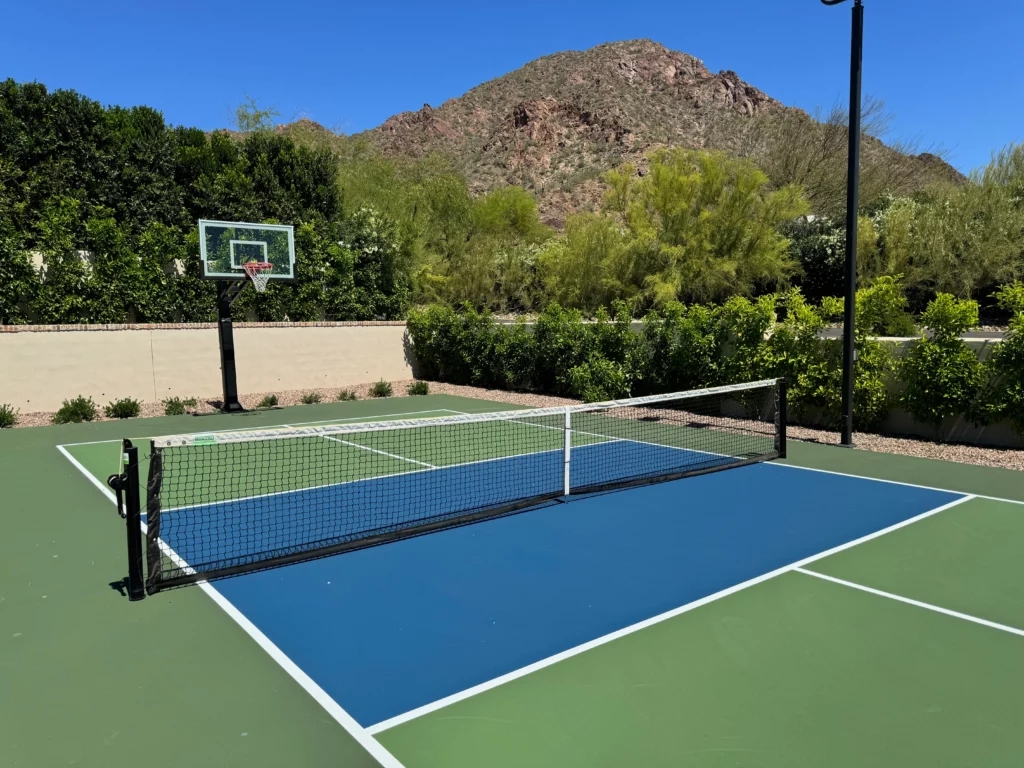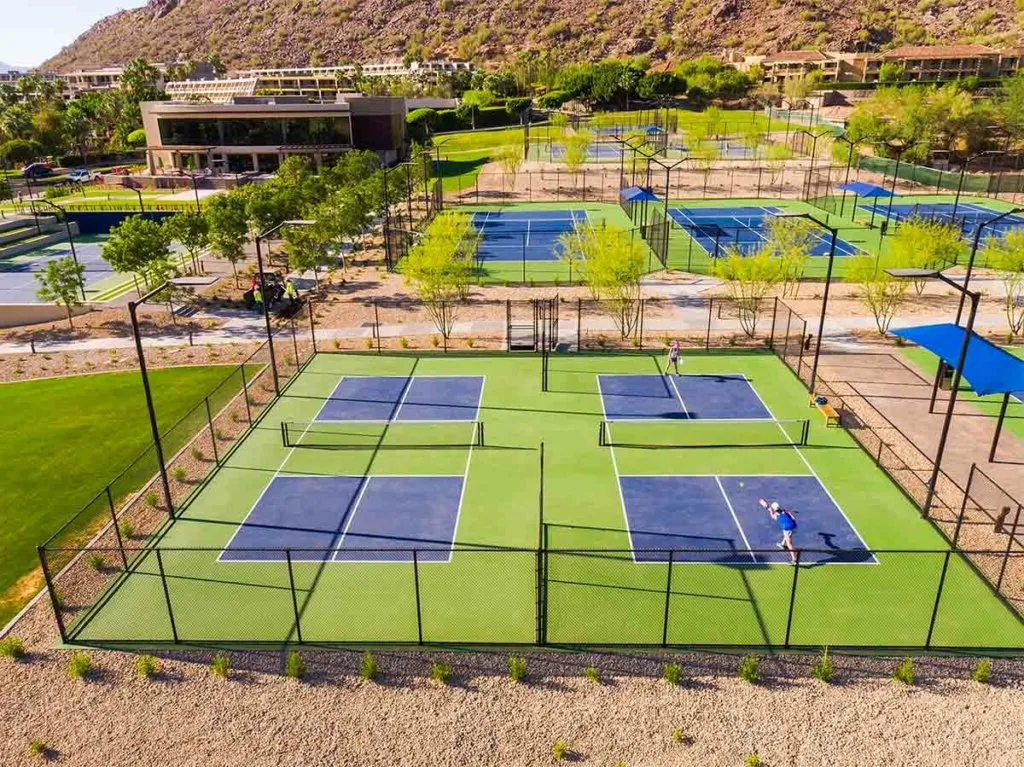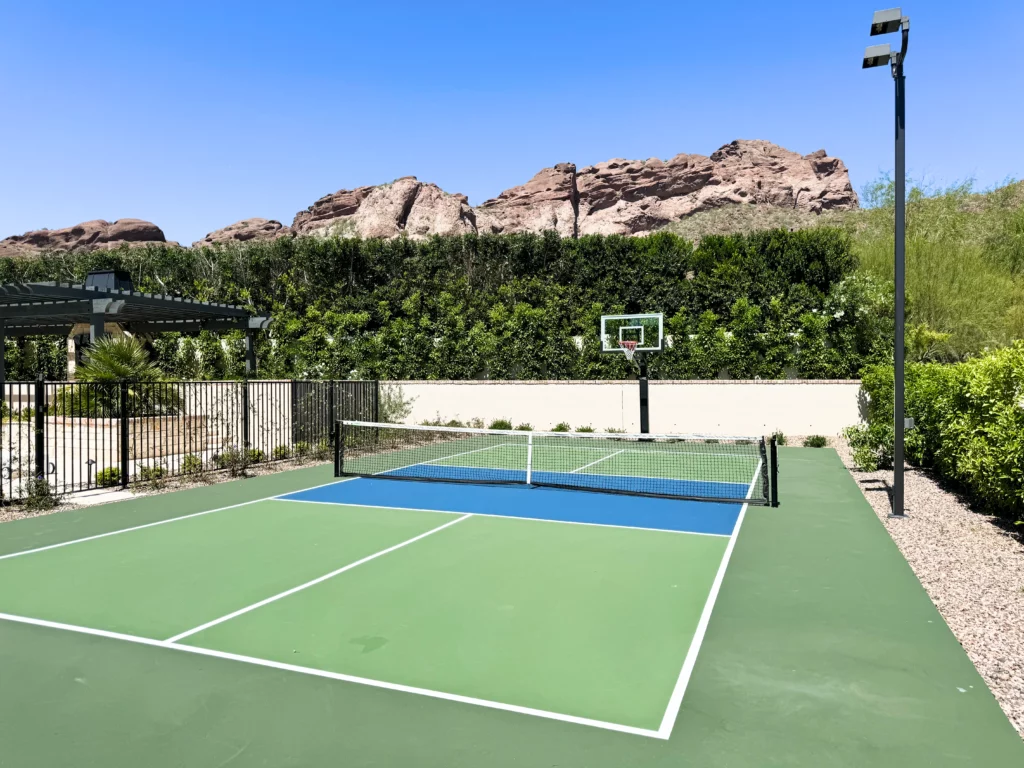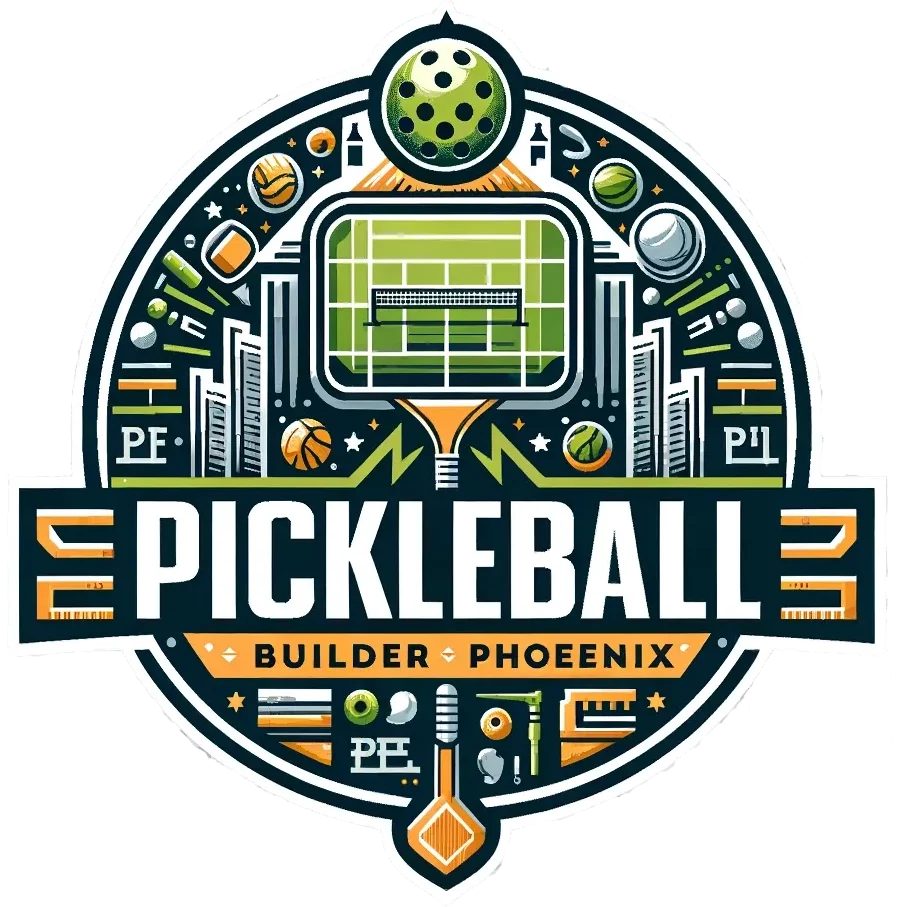
Custom Court Design
Our experienced professionals are dedicated to delivering customized solutions that meet the specific needs and preferences of each client.
Licensed Contractor | ROC 345489

Expertly designed and constructed pickleball courts
Personalized pickleball court designs to suit your needs
Built to withstand the desert heat and provide years of enjoyment
Contact us for a free consultation
We are here to help you create the perfect pickleball court
Pickleball Court Builder & Installation in Phoenix Arizona: Expert Guide
Pickleball is a popular sport that has been gaining traction in recent years, and with its rise in popularity comes the need for more pickleball courts. If you’re in the Phoenix area and looking to build or install a pickleball court, you’re in luck. There are several companies that specialize in pickleball court construction and installation in Phoenix, Arizona.

Understanding Pickleball Court Construction is essential before starting a project. Planning and Design are crucial steps in the process to ensure that the court meets all necessary requirements and specifications. Pickleball Court Builders in Phoenix can help with this process, providing expert advice and guidance to ensure that your project is a success. Once the planning and design are complete, the installation process can begin. Maintenance and Upkeep are also important factors to consider to ensure that your court remains in good condition for years to come. Customization Options are available to make your court unique and fit your specific needs. Cost Considerations and Project Timeline are also important factors to consider when planning your project.
Key Takeaways
- Pickleball court construction and installation is available in Phoenix, Arizona
- Planning and Design are crucial steps in the process
- Maintenance and Upkeep are important factors to consider for long-term success
Understanding Pickleball Court Construction
Pickleball Court Dimensions
Pickleball courts are smaller than a standard tennis court, measuring 20 feet by 44 feet. The court is divided into two halves by a net that is 36 inches high at the edges and 34 inches high in the center. The court is also marked with lines to indicate the service areas, non-volley zones, and boundaries. These lines are typically 2 inches wide and are painted in bright colors to make them easily visible.
Surface Materials
The surface of a pickleball court can be made of a variety of materials, including concrete, asphalt, or even synthetic turf. Concrete and asphalt are the most common materials used for pickleball courts, as they provide a durable and long-lasting surface that can withstand heavy use. Synthetic turf is also becoming more popular, as it provides a softer surface that is easier on the joints.
Court Orientation and Location
When building a pickleball court, it is important to consider the orientation and location of the court. The court should be oriented north-south to minimize the impact of the sun on the players. It should also be located in an area that is flat and free from obstacles, such as trees or buildings. Ideally, the court should be located in an area that is easily accessible and has ample parking.
Overall, building a pickleball court requires careful planning and consideration of a variety of factors. By understanding the dimensions, surface materials, and orientation and location of the court, builders can create a high-quality court that will provide years of enjoyment for players of all skill levels.
Planning and Design – Court Resurfacing
When it comes to building a pickleball court in Phoenix, proper planning and design are crucial to ensure the court meets the necessary requirements and provides a safe and enjoyable playing experience. This section will cover the key factors for site selection, design considerations, and the permitting process.
Site Selection
When selecting a site for a pickleball court, there are a few important factors to consider. The court should be located on a level surface with good drainage to prevent standing water. It should also be situated away from any obstructions such as trees or buildings that could interfere with play. Additionally, the court should be easily accessible with adequate parking nearby.
Design Considerations
The design of the pickleball court should adhere to official regulations and guidelines. The court dimensions should be 20 feet wide by 44 feet long with a net height of 36 inches at the ends and 34 inches at the center. The surface should be made of a non-slip material such as concrete or asphalt and painted with official court markings. Additionally, the court should have proper fencing and lighting for safety and security.
Permitting Process
Before beginning construction on a pickleball court in Phoenix, it is important to obtain the necessary permits from the city. This may include a building permit, zoning permit, and electrical permit if lighting is installed. The permitting process can vary depending on the location and complexity of the project, so it is important to consult with local authorities and follow all regulations and guidelines.
Overall, proper planning and design are essential for building a high-quality pickleball court in Phoenix. By carefully considering site selection, design considerations, and the permitting process, players can enjoy a safe and enjoyable playing experience.
Pickleball Court Builders in Phoenix
Pickleball is a fun and exciting sport that has become increasingly popular in recent years. If you’re a resident of Phoenix, Arizona, and looking to build your own pickleball court, you’ll want to find a reliable and experienced builder to ensure your court is built to your specifications and lasts for years to come.
Choosing the Right Builder
When choosing a pickleball court builder in Phoenix, it’s important to do your research and find a builder with experience in building pickleball courts. Look for a builder who has a portfolio of completed projects and positive reviews from previous customers. It’s also important to ensure that the builder you choose uses high-quality materials and has a proven track record of building durable and long-lasting courts.
Local Builder Advantages
Choosing a local builder for your pickleball court installation in Phoenix has several advantages. Local builders are familiar with the local climate and can recommend the best materials and construction techniques for your court. They are also more accessible and can provide more personalized service throughout the entire construction process. Additionally, working with a local builder can help support the local economy and businesses in your community.
In conclusion, when looking for a pickleball court builder in Phoenix, it’s important to choose a reliable and experienced builder who uses high-quality materials and has a proven track record of building durable and long-lasting courts. Choosing a local builder can also provide several advantages, including personalized service and support for the local economy.
Installation Process
Site Preparation
Before the installation process begins, the site needs to be prepared. This involves clearing the area of any debris, rocks, or other obstacles. The area should be leveled to ensure a smooth playing surface. The dimensions of the court should also be marked out to ensure that it meets the required specifications.
Surface Installation
Once the site is prepared, the surface installation process can begin. The most common surface used for pickleball courts is asphalt, but other options such as concrete or synthetic turf are also available. The surface is installed in layers, with each layer being carefully leveled and compacted to ensure a smooth and level playing surface. Once the surface is installed, it is coated with a special paint that is designed to provide traction and durability.
Fencing and Accessories
The final step in the installation process is the installation of fencing and other accessories. Fencing is an important safety feature that keeps the ball in play and prevents players from accidentally running into each other. The fence should be at least 10 feet high and should be made of a durable material such as chain link. Other accessories such as net posts, nets, and court markers should also be installed at this time.
Overall, the installation process for a pickleball court requires careful planning and attention to detail. By following the proper procedures and using high-quality materials, a professional pickleball court builder can create a court that is safe, durable, and provides a great playing experience for players of all skill levels.
Maintenance and Upkeep
Regular Maintenance Schedule
To ensure the longevity of the pickleball court, regular maintenance is necessary. A weekly cleaning of the court surface is recommended to remove any debris or dirt that may have accumulated. This can be done using a broom or leaf blower. In addition, it is important to inspect the court for any cracks or damage that may have occurred and repair them promptly.
It is also important to keep the court lines clean and visible. This can be achieved by using a pressure washer or a mild detergent and water solution. Regularly checking and maintaining the net and posts is also important to ensure they are in good condition and secure.
Long-Term Care
In addition to regular maintenance, there are several long-term care measures that can be taken to ensure the pickleball court remains in good condition. One of the most important is to ensure proper drainage. Standing water on the court can cause damage and should be avoided. Installing a drainage system or slope can help prevent this issue.
Another important aspect of long-term care is resurfacing the court. Over time, the court surface may become worn or damaged, and resurfacing can help restore the court to its original condition. The frequency of resurfacing depends on the amount of use the court receives, but it is generally recommended to do so every 5-7 years.
By following a regular maintenance schedule and implementing long-term care measures, pickleball court owners can ensure their court remains in good condition for years to come.
Customization Options

Pickleball courts can be customized to fit the specific needs and preferences of the players. Here are some of the customization options that are available:
Color and Design Customization
Pickleball court builders in Phoenix, Arizona offer a wide range of color and design options for their clients. Players can choose from a variety of colors for their court surface, including green, blue, and red. They can also add custom logos or designs to their court surface to make it unique.
In addition, players can choose the type of surface they want for their court. Some options include cushioned surfaces, which provide extra shock absorption, and textured surfaces, which provide better traction.
Lighting and Shade Structures
Lighting is an important consideration for players who want to play pickleball at night or in low-light conditions. Pickleball court builders in Phoenix, Arizona can install lighting systems that provide optimal visibility for players.
Shade structures are also available for players who want to protect themselves from the sun during the day. These structures can be customized to fit the size and shape of the court, and can be made from a variety of materials, including canvas and metal.
Overall, there are many customization options available for pickleball courts in Phoenix, Arizona. Players can work with their court builder to create a court that meets their specific needs and preferences.
Cost Considerations
Budgeting for Your Project
When it comes to building a pickleball court in Phoenix, Arizona, cost is an important factor to consider. The cost of building a pickleball court can vary depending on a variety of factors such as the size of the court, the type of surface, and any additional features like lighting or fencing.
It is important to create a budget for your project before starting any construction. This will help you determine what you can afford and what type of court you can build. Consider all the expenses involved in the project, including materials, labor, and any permits or fees required by the city.
Cost-Saving Tips
There are several ways to save money when building a pickleball court in Phoenix. Here are a few cost-saving tips to consider:
- Choose a smaller court size: A standard pickleball court is 20 feet wide and 44 feet long. However, you can save money by building a smaller court, such as a 30-foot by 60-foot court, which is still large enough for recreational play.
- Use a less expensive surface: While an asphalt or concrete surface is the most durable option, it can also be more expensive. Consider using a less expensive surface like compacted gravel or decomposed granite.
- Shop around for materials: Don’t settle for the first quote you receive for materials. Shop around and compare prices from different suppliers to find the best deal.
- DIY installation: If you have experience with construction, consider installing the court yourself to save on labor costs. However, it is important to ensure that the court is built to regulation standards to ensure safety and proper play.
By considering these cost-saving tips, you can build a pickleball court in Phoenix that fits your budget without sacrificing quality or safety.
Project Timeline
Initial Consultation to Completion
The timeline for a pickleball court installation project in Phoenix, Arizona varies depending on several factors. The process typically begins with an initial consultation where the court builder meets with the client to discuss their needs and preferences. During this consultation, the builder will assess the site and provide recommendations based on the available space, budget, and other factors.
Once the client approves the design and budget, the court builder will begin the installation process. The timeline for completion can range from a few weeks to several months depending on the complexity of the project and any unforeseen issues that may arise.
During the installation process, the court builder will typically take the following steps:
- Excavate the site and prepare the base
- Install the fencing and lighting
- Lay the court surface
- Add any finishing touches, such as line striping and net installation
Factors Affecting Timeline
Several factors can affect the timeline for a pickleball court installation project in Phoenix, Arizona. These include:
- Site preparation: If the site requires extensive excavation or leveling, this can add time to the project timeline.
- Weather conditions: Extreme heat or rain can delay the installation process.
- Permitting and approvals: Depending on the location and zoning regulations, obtaining the necessary permits and approvals can take time.
- Customization: If the client requests custom features or materials, this can add time to the project timeline.
Overall, the timeline for a pickleball court installation project in Phoenix, Arizona can vary depending on several factors. However, by working with an experienced court builder and being prepared for potential delays, clients can ensure a smooth and successful installation process.
Frequently Asked Questions
What are the standard dimensions for a regulation pickleball court?
A regulation pickleball court is 20 feet wide and 44 feet long. The playing area is divided into two halves by a 34-inch high net. The service court is 10 feet wide and is located 7 feet from the net on both sides.
How much does it typically cost to install a pickleball court in Phoenix, Arizona?
The cost of installing a pickleball court in Phoenix, Arizona can vary depending on several factors, including the size of the court, the materials used, and the amount of site preparation required.
What is the required space for constructing a pickleball court on my property?
A pickleball court is 20 ft wide by 44 ft long. However, it is recommended to have additional space around the court for safety and convenience. The ideal space for constructing a pickleball court on your property is 30 feet wide and 60 feet long. This can be adjusted down as with a minimum space of 24 ft by 50 ft needed.
Can a tennis court be converted into a pickleball court, and what is involved in the process?
Yes, a tennis court can be converted into a pickleball court. The process involves removing the tennis net, adjusting the court lines, and installing a new pickleball net. However, it is recommended to consult with a professional to ensure the conversion is done correctly.
What are the essential considerations when installing a pickleball court in a backyard?
When installing a pickleball court in a backyard, it is essential to consider the slope of the land, the drainage, and the amount of sunlight the court will receive. It is also important to choose the right surface material, such as concrete, asphalt, or synthetic turf, based on your needs and budget.
